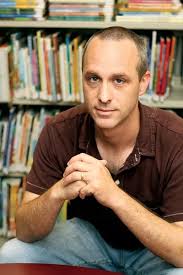A Quote by Mark Helprin
Peter Lake had no illusions about mortality. He knew that it made everyone perfectly equal, and that the treasures of the earth were movement, courage, laughter, and love. The wealthy could not buy these things. On the contrary, they were for the taking.
Related Quotes
While we were saying all these things about taking care of our fellow men, we were flying around, eating meat, buying things, driving a car, having two homes. Then we realized that we of course are a huge part of the problem, in fact, we were part of the problem. Greta could not get around that, and it made her upset... She told us we had to change.
I have a very close friend who is a brilliant clown, and I always wanted to do a show with him. So I did one year at La MaMa Theatre. I had not done stilts before that show, and I had about two weeks to learn how to do that, and they were just made with off-off Broadway money. The ones that I had in Rogue One were made by [Industrial Light & Magic]. So they were really easy. They were made with actual prosthetic feet on the bottom. They were athletic, in a way. I could run in them. There was a bounce to them that I could use.
My relationship to the desecration of the earth was very theoretical and intellectual until I got sick. I could never watch anything about polar bears dying or the death of bees. There were certain things I knew I couldn't go near because they were too devastating. But I don't think until I got cancer did I get it in my body, what was happening to the earth. I finally went: "Oh! Earth! Organism!"
They were still in the happier stage of love. They were full of brave illusions about each other, tremendous illusions, so that the communion of self with self seemed to be on a plane where no other human relations mattered. They both seemed to have arrived there with an extraordinary innocence as though a series of pure accidents had driven them together, so many accidents that at last they were forced to conclude that they were for each other. They had arrived with clean hands, or so it seemed, after no traffic with the merely curious and clandestine.
Whether we're talking about the New Deal or the Great Society: they didn't come about because they wanted to buy people off with "hush money." They were the outcomes of struggles. They were the outcomes, in the 1930s, of a viable socialist-communist movement. They were the outcomes of a viable workers' movement. FDR didn't give in because he wanted to shut people up, he gave in because he was under pressure. He had no choice.
One of the first speaking roles I had was in a film called 'Svengali', with Peter O'Toole and Elizabeth Ashley. I was a waiter, and I had about three lines. And I was ready! I had been around people like that, and I knew they were just actors. All the work I had done, it was all there, and I felt like I knew all the mechanics.
My parents were perfectly open-minded about everything. They never tried to convince us of what was true or what wasn't true in their minds. We were just presented with the information that was around and pretty much allowed - though, I mean, we knew how they felt. We knew they didn't go to church. So obviously that had an effect.
Something about this made Reynie uneasy. Had he done so badly? Was this meant to test his courage? He did as he was told, closing his eyes and bracing himself as best he could. "Why are you flinching?" the pencil woman asked. "I don't know. I thought maybe you were going to slap me." "Don't be ridiculous. I could slap you perfectly well with your eyes open. I'm only going to blindfold you.
He believed that he must, that he could and would recover the good things, the happy things, the easy tranquil things of life. He had made mistakes, but he could overlook these. He had been a fool, but that could be forgiven. The time wasted--must be relinquished. What else could one do about it? Things were too complex, but they might be reduced to simplicity again. Recovery was possible.
No one worries about you like your mother, and when she is gone, the world seems unsafe, things that happen unwieldy. You cannot turn to her anymore, and it changes your life forever. There is no one on earth who knew you from the day you were born; who knew why you cried, or when you'd had enough food; who knew exactly what to say when you were hurting; and who encouraged you to grow a good heart. When that layer goes, whatever is left of your childhood goes with her.





































